- Home
- John Irving
The World According to Garp
The World According to Garp Read online
ALSO BY JOHN IRVING
BOOKS
Until I Find You
The Fourth Hand
My Movie Business
A Widow for One Year
The Imaginary Girlfriend A Son of the Circus
Trying to Save Piggy Sneed A Prayer for Owen Meany The Cider House Rules
The Hotel New Hampshire The 158-Pound Marriage
The Water-Method Man
Setting Free the Bears
SCREENPLAYS
The Cider House Rules
Vintage Canada Edition, 2000
Copyright (c) 1976, 1977, 1978 Garp Enterprises Canada Ltd.
Afterword copyright (c) 1998 Garp Enterprises Canada Ltd.
The Afterword first appeared as an Introduction to the 1998 Modern Library edition of The World According to Garp.
All rights reserved under International and Pan-American Copyright Conventions. Published by Vintage Canada, a division of Penguin Random House Canada Limited, and simultaneously in the United States by The Ballantine Publishing Group, a division of Random House, Inc., New York, in 2000. Distributed by Penguin Random House Canada Limited, Toronto.
Vintage Canada and colophon are registered trademarks of Penguin Random House Canada Limited.
The author wishes to express his gratitude to the Guggenheim Foundation.
Grateful acknowledgment is made for permission to reprint "The Plot Against the Giant." Copyright 1923, 1951 by Wallace Stevens. Reprinted from The Collected Poems of Wallace Stevens, by permission of Alfred A. Knopf, a division of Penguin Random House, LLC.
www.penguinrandomhouse.ca
Portions of this book have appeared in different form in the following magazines: Antaeus, Esquire, Penthouse, Playboy, Ploughshares, and Swank.
Library and Archives Canada Cataloguing in Publication Data is available.
Irving, John
The world according to Garp
ISBN 9780676973822
e-Book ISBN 9780735276185
I. Title.
Cover design by CS Richardson
Cover photo by Alexa Garbarino
v5.2
a
JOHN IRVING
John Irving, a highly imaginative storyteller whose fictional values and narrative techniques have invited comparison with Charles Dickens and other popular nineteenth-century novelists, was born in Exeter, New Hampshire, on March 2, 1942. Irving was educated at Phillips Exeter Academy, where he acquired his lifelong interests in wrestling and writing. He attended the University of Pittsburgh and the Institute for European Studies in Vienna, a city that figures prominently in his earlier fiction. He graduated from the University of New Hampshire in 1965 and subsequently earned an M.F.A. from the University of Iowa, where he studied with Kurt Vonnegut. Later Irving taught at Mount Holyoke College, the Writers' Workshop in Iowa, and the Bread Loaf Writers' Conference. He has been awarded fellowships from the National Endowment for the Arts, the Rockefeller Foundation, and the Guggenheim Foundation. In 1992, John Irving was inducted into the National Wrestling Hall of Fame in Stillwater, Oklahoma and in 2001, he was elected to the American Academy of Arts and Letters. The father of three sons, Irving lives in Vermont and Toronto with his wife, Janet Turnbull.
Irving made an astonishing literary debut with Setting Free the Bears, his first novel. Published in 1969, it recounts the picaresque adventures of Siggy and Graff, two young men who set out to liberate the animals in Vienna's Hietzinger Zoo as a means of avenging one family's suffering during World War II. "Imagine a mixture of Till Eulenspiegel and Ken Kesey, and you've got the range of the merry pranksters who hot-rod through Mr. Irving's book," wrote The New York Times. "The most nourishing, satisfying comedy I have read in years," said Kurt Vonnegut. The Water-Method Man (1972), his next work, is an involved and richly textured story about a blundering graduate student whose life is collapsing around him. Joseph Heller called it "an endearing novel--witty, wise, rambunctious, sad." Anne Tyler rated the book "consistently hilarious...a pure joy," and deemed Irving "one of our most original writers...infinitely inventive and given to spectacular leaps of the imagination." Irving's third novel, The 158-Pound Marriage (1974), is an erotic, bittersweet tale about a menage a quatre in a New England university town. "The 158-Pound Marriage is as lean and concentrated as a mine shaft," said critic Terrence Des Pres. "Irving looks cunningly beyond the eye-catching gyrations of the mating dance to the morning-after implications," added The Washington Post.
The World According to Garp placed Irving at the top of bestseller lists around the world when it was published in 1978. Rich with lunacy and sorrow, the novel is a splendid panoply of attitudes toward sex, marriage, and parenthood, the feminist movement, and the concept of delineated sexual roles. "Nothing in contemporary fiction matches it," said Terrence Des Pres in The New Republic. "Irving's blend of gravity and play is unique, audacious, almost blasphemous....The World According to Garp is brilliant, funny, and consistently wise; it is a work of vast talent." Critic Gabriel Miller stated: "The World According to Garp is at once a personal masterpiece, an important contemporary artifact, a clear explication of Irving's moral and aesthetic vision, and a certification of his talent. It signals the arrival of a writer in full command of his abilities."
Irving's string of bestsellers during the 1980s makes it clear why The New York Times Book Review judged him "an abundantly and even joyfully talented storyteller." The Hotel New Hampshire (1981), which the Book Review hailed as "a hectic, gaudy saga with the verve of a Marx Brothers movie," spans nearly four generations of the troubled Berry family. "Like Garp, The Hotel New Hampshire is a startlingly original family saga that combines macabre humor with Dickensian sentiment and outrage at cruelty, dogmatism and injustice," praised Time. The Cider House Rules (1985), Irving's most didactic work, examines the issue of abortion while chronicling life in a Maine orphanage during the early twentieth century. It was made into a feature film in 1999, directed by Lasse Hallstrom, and Irving won an Oscar for Best Adapted Screenplay. "By turns witty, tenderhearted, fervent and scarifying...this novel is an example, now rare, of the courage of imaginative ardor," said The New York Times Book Review. A Prayer for Owen Meany (1989), the comic but bitterly political tale of a Christlike hero growing up in a small New Hampshire town in the Vietnam years, is vintage Irving.
"Mr. Irving is more than popular," observed The New York Times as his succession of bestsellers continued throughout the 1990s. "He is a Populist, determined to keep alive the Dickensian tradition that revels in colorful set pieces and teaches moral lessons." A Son of the Circus (1994), "his most entertaining novel since Garp" according to The New York Times Book Review, takes readers on a raucous journey through present-day Bombay in the company of Dr. Farrokh Daruwalla, circus fan, screenwriter, and researcher into dwarfism who may be on the trail of a serial killer. "Irving's most daring and vibrant novel," wrote Bharati Mukherjee in The Washington Post Book World. "This story of circus-as-India is told with gusto and delightful irreverence." Trying to Save Piggy Sneed (1996) was a first for Irving: a mischievous collection of memoirs, short stories, and essays that reveal a great deal about his views on writing fiction. The Denver Post called the book "a rich, wonderful, and diverse look into the creative mind of one of America's most imaginative and passionate novelists....Irving again proves he has enough imagination for ten writers." A Widow for One Year (1998) is a multilayered love story that tells of a renowned author, recently widowed, who falls in love for the first time at the age of forty-one. Both ribald and erotic, it is a memorable novel about the passage of time and the relentlessness of grief. The Fourth Hand (2001) is a brilliantly comic novel about New York journalist Patrick Wallingford, who inadvertently becomes
his own headline when his left hand is eaten by a lion in India. USA Today called it "a blend of sexual farce, journalistic satire, and tender love story"; the Chicago Sun-Times hailed it as "a riveting entertainment."
John Irving's latest work, Until I Find You (2005) tells the story of actor Jack Burns; his mother, Alice (a tattoo artist); and the search for Jack's missing father, a church organist who is addicted to being tattooed. Newsweek said, "For a novel that features child abuse, several tragic deaths and a genuine madman, this is--weird as it sounds--a very funny book....Until I Find You has one of the most satisfying endings I've read in ages....It's a great payoff."
"Fashioning wildly inventive, delightfully intricate narratives out of his sense of humor, sense of dread and sense of duty, Irving blends the madcap, the macabre, and the mundane into sprawling, spiraling comedies of life," observed The Saturday Review. And Time concluded: "Irving's popularity is not hard to understand. His world is really the world according to nearly everyone."
The World According to Garp: An Introduction
BY JOHN IRVING, MAY 1998
My eldest son, Colin, who is now thirty-three, was twelve when he first read The World According to Garp--in manuscript, and with me anxiously awaiting his reaction. (I still believe there are scenes in the book that are unsuitable for twelve-year-olds.) Although Garp was my fourth novel, it was the first one Colin could read, and I remember feeling both proud and nervous at the prospect of being judged by one of my children; that the book was dedicated to Colin, and to his younger brother Brendan, made the moment even more tense and exciting.
Surely everyone knows the two most common questions that are asked of any novelist. What is your book about? And is it autobiographical? These questions and their answers have never been of compelling interest to me--if it's a good novel, both the questions and the answers are irrelevant--but while my twelve-year-old son was reading The World According to Garp, I anticipated that these were the very questions he would ask me, and I thought very hard about how I might answer him.
Now, twenty years later--and having written nine novels--it occurs to me that I have never thought as hard about my answers to those "irrelevant" questions as I did when Colin was reading Garp. What I mean, of course, is that it's perfectly understandable and completely permissible for a twelve-year-old to ask those questions, whereas (in my opinion) an adult has no business asking them. An adult who reads a novel should know what the book is "about"; an adult should also know that whether a novel is autobiographical or not is beside the point--unless the alleged adult is hopelessly inexperienced or totally innocent of the ways of fiction.
Anyway, while Colin was off in his room reading the manuscript of Garp, I found myself agonizing over what the novel was "about." To my horror, and full of self-loathing, I jumped to the conclusion that the book was about the temptations of lust--lust leads just about everyone to a miserable end. There is even a chapter called "More Lust," as if there weren't enough already. I was positively ashamed of how much lust was in the book, not to mention how punitive a novel I thought it was; indeed, every character in the story who indulges his or her lust is severely punished. And, among the culprits and the victims, physical mutilations abound: characters lose eyes and arms and tongues--even penises!
It had seemed at one time, when I was beginning the novel, that the polarization of the sexes was a dominant theme; the story was about men and women growing farther and farther apart. Just look at the plot: a remarkable, albeit outspoken, woman (Garp's mother, Jenny Fields) is killed by a lunatic male who hates women; and Garp himself is assassinated by a lunatic female who hates men.
"In this dirty-minded world," Jenny thinks, "you are either somebody's wife or somebody's whore--or fast on your way to becoming one or the other. If you don't fit either category, then everyone tries to make you think there is something wrong with you." But there is nothing wrong with Garp's mother. In her autobiography, Jenny writes: "I wanted a job and I wanted to live alone. That made me a sexual suspect. Then I wanted a baby, but I didn't want to have to share my body or my life to have one. That made me a sexual suspect, too." And being what she calls "a sexual suspect" also makes Jenny a target of antifeminist hatred--just as Garp, her son, becomes a target of radical feminists.
But the principal point about Garp's mother is stated in the first chapter: "Jenny Fields discovered that you got more respect from shocking other people than you got from trying to live your own life with a little privacy." Twenty years later, Jenny's discovery seems more true--not to mention more defensible--than it seemed to me in 1978. And I don't always agree with Jenny. "Between men and women," she says, "only death is shared equally." Late in the novel, in the last chapter, I disagree with her as follows: "...between men and women, not even death gets shared equally. Men get to die more, too."
There was a time when Jenny threatened to take over the novel, when I wasn't at all sure if Garp or his mother was the main character; something of my indecision remains. I once wanted to begin the book with Chapter 11 (the "Mrs. Ralph" chapter), but that would have necessitated a flashback of 313 pages. I next tried beginning the novel with Chapter 9, the chapter called "The Eternal Husband." My first sentence was: "In the Yellow Pages of Garp's phone directory, Marriage was listed near Lumber." I used to think the novel was about marriage, specifically the perils of marriage--more specifically, the threat of lust to marriage. "Garp had never realized," I wrote, "that there were more marriage counselors than lumber-yards." (Is it any wonder I was anxious that a twelve-year-old was reading this book?)
And, at another time, The World According to Garp began with Chapter 3 ("What He Wanted to Be When He Grew Up")--for isn't the novel also about that? Garp wants to be a writer; it is a novel about a novelist, although almost no reader of the book remembers it as such. Yet Garp's origins as an author are crucial to the story--"the beginning of a writer's long-sought trance, wherein the world falls under one embracing tone of voice." And from the beginning, there was an epilogue. I knew everything that happened before I began--I always do. "An epilogue," Garp writes, "is more than a body count. An epilogue, in the disguise of wrapping up the past, is really a way of warning us about the future."
But to begin the novel as I once tried, with Chapter 3, was too historical, too emotionally remote. "In 1781 the widow and children of Everett Steering founded Steering Academy, as it was first called, because Everett Steering had announced to his family, while carving his last Christmas goose, that his only disappointment with his town was that he had not provided his boys with an academy capable of preparing them for a higher education. He did not mention his girls." There again is the sexual-polarization theme--as early as 1781!
Meanwhile, in the privacy of his room, Colin was reading on and on. The World According to Garp would never have satisfied a twelve-year-old if it had been only a novel about a novelist, although much of what mattered to me about the book was exactly that. I shall always see Garp prowling in his neighborhood at night, taking a dim view of his neighbors' television sets. "There is the faint, trapped warble from some televisions tuned in to The Late Show, and the blue-gray glow from the picture tubes throbs from a few of the houses. To Garp this glow looks like cancer, insidious and numbing, putting the world to sleep. Maybe television causes cancer, Garp thinks; but his real irritation is a writer's irritation: he knows that wherever the TV glows, there sits someone who isn't reading."
And what of the Under Toad? Colin was familiar with its source. It was his brother Brendan who misunderstood him one summer at the beach on Long Island. "Watch out for the undertow, Brendan," Colin warned him--at the time, Brendan was six. (Colin was ten.) Brendan had never heard of an undertow; he thought Colin said Under Toad. Somewhere, under the water, lurked a dangerous toad.
"What can it do to you?" Brendan asked his brother.
"Pull you under, suck you out to sea," Colin said.
That did it for Brendan at the beach--he wouldn't go near the ocean. It was weeks
later when I saw him standing at some distance from the water's edge, staring into the waves.
"What are you doing?" I asked him.
"I'm looking for the Under Toad," Brendan said. "How big is it? What color is it? How fast can it swim?"
The World According to Garp wouldn't exist without the Under Toad. Brendan got me started.
To my surprise, Colin didn't ask me what the book was "about"--he told me. "It's about the fear of death, I think," Colin began. "Maybe more accurately, the fear of the death of children--or of anyone you love."
I remembered then that, among my other attempts to begin the novel, I had long ago begun with what would become the last sentence ("...in the world according to Garp, we are all terminal cases"), and I recalled how that sentence had moved through the book; I kept pushing it ahead. It was once the first sentence of the second chapter; later it was the last sentence of the tenth chapter, and so on, until it became the end of the novel--the only possible ending. Not surprisingly, Garp describes a novelist as "a doctor who sees only terminal cases."
Yet Colin, my twelve-year-old, surprised me by telling me what my book was about. The "Mrs. Ralph" chapter, my first false beginning, begins as follows: "If Garp could have been granted one vast and naive wish, it would have been that he could make the world safe. For children and for grownups. The world struck Garp as unnecessarily perilous for both." At age twelve, Colin had zeroed in on that. Garp lives in "a safe suburb of a small, safe city," but neither he nor his children are safe. The Under Toad will get him in the end--as it gets his mother, as it gets his younger son. "Just be careful!" Garp is always telling his children, as I am still telling mine.
It is a novel about being careful, and about that not being enough.
The real beginning to the book, the one I finally chose, describes Jenny's habit of carrying a scalpel in her purse. Jenny is a nurse, and an unmarried woman who wants nothing to do with men; she carries the scalpel for self-defense. And so The World According to Garp begins with an act of violence--Jenny cuts a soldier, a stranger who thrusts his hand under her dress (her nurse's uniform). "Garp's mother, Jenny Fields, was arrested in Boston in 1942 for wounding a man in a movie theater." Finally, it was just that simple; I began at the beginning of the main story, before Jenny is pregnant with Garp--at the moment she decides she wants to have a baby without having a husband.

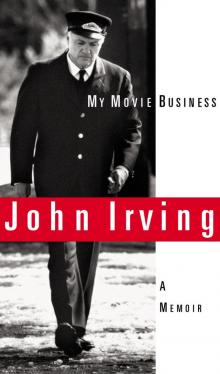 My Movie Business: A Memoir
My Movie Business: A Memoir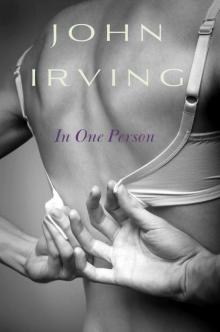 In One Person
In One Person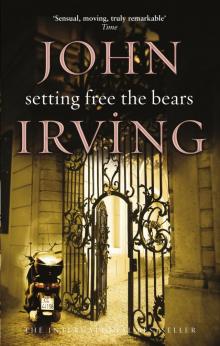 Setting Free the Bears
Setting Free the Bears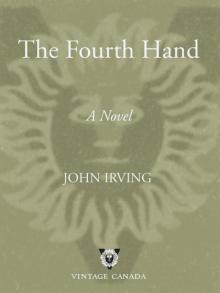 The Fourth Hand
The Fourth Hand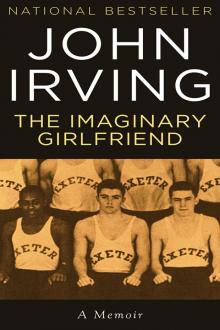 The Imaginary Girlfriend
The Imaginary Girlfriend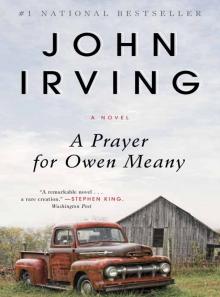 A Prayer for Owen Meany
A Prayer for Owen Meany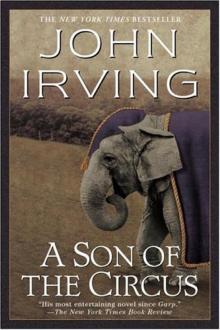 A Son of the Circus
A Son of the Circus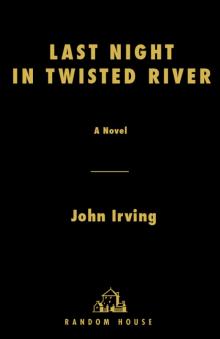 Last Night in Twisted River
Last Night in Twisted River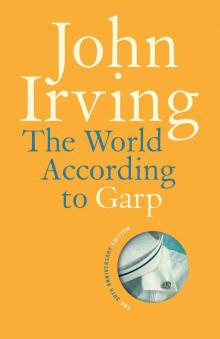 The World According to Garp
The World According to Garp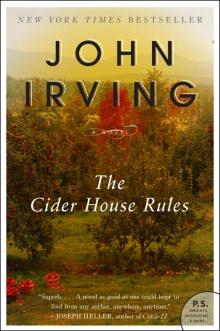 The Cider House Rules
The Cider House Rules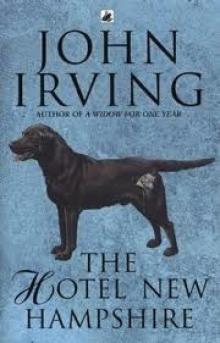 The Hotel New Hampshire
The Hotel New Hampshire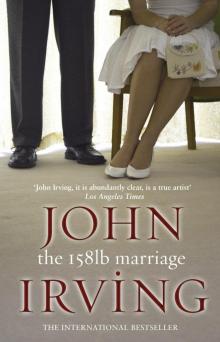 The 158-Pound Marriage
The 158-Pound Marriage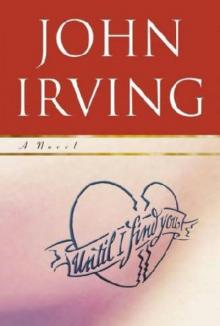 Until I Find You
Until I Find You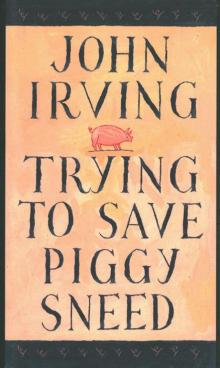 Trying to Save Piggy Sneed
Trying to Save Piggy Sneed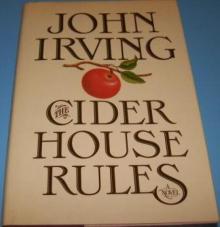 Cider House Rules
Cider House Rules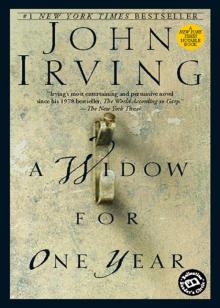 A Widow for One Year
A Widow for One Year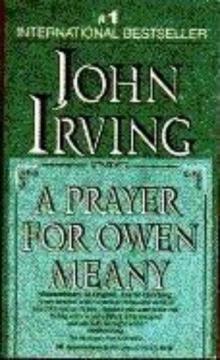 A prayer for Owen Meany: a novel
A prayer for Owen Meany: a novel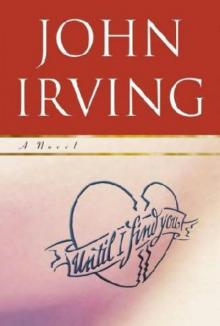 (2005) Until I Find You
(2005) Until I Find You